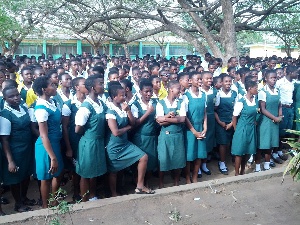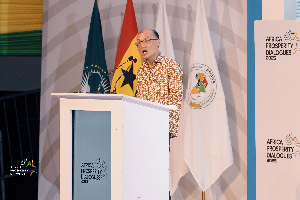“Every student can learning but it takes students different ways to get there”-Schleicher, 2018
September is here again and among the ads running on television as well as radio is this catchy one: “They are going back!” Who are going back? And where are they going? What are they going to do?
It is back to school time and students as well as teachers are going back to school! Students are happy to go back to school, many to be with their friends whose company they have missed for long time. That notwithstanding, this is a time of promise when students are full of great intentions.
Everyone hopes to get the top marks, never to miss classes, and to make sure all assignments are done and on time. Teachers are also happy because they are going back to the work they love to do most-teaching!
Going back to school after a long break is not a big issue in the western world, but in Ghana it is. So let’s encourage our youth roaming the streets or working as shoe-shine boys, and as prostitutes in Ghana as well as factory hands in Toronto and elsewhere to go back to school.
I would like to urge governments, parents and teachers to help keep our children in school. For, the economy or the price of staying in school is far better for our children and the society than the price of dropping out of school.
Governments and Educational Funding:
It is good news that the government of Ghana last school year introduced free Senior High School (SHS) education to all students in the country.
Though there might be teething problems with the implementation of such huge education project in the nation, with proper administration and respectable co-operation of teachers the project will be successful. It will surely increase the access to education by many young people in the country.
To governments I say, spend more money on education than on arms. Education is the best investment you can make for the protection of your people. The best against under-development and even against coups as we fear in Ghana!
You see, spending more money on arms and bigger armed forces than on education eventually undermines our national security that we seek as a government to protect. We spend less money on education and thus allow our education system to deteriorate producing more school drop-outs than would have been. These drop-outs resort to dubious and criminal ways of living. Many become security problem for our nation. They become lawless, uneducable and politically difficult to deal with as citizens. I think what we need in our beloved country-Ghana security wise is a better education system that can produce the finest of intelligence which large armed forces and stock piles of the most sophisticated arms would not bring about. Better education leads to development, which in turn alleviates poverty-a fertile ground for dissatisfaction, backwardness, coups and terrorism!
I am encouraged by the welcome message from the Director of Education of the Toronto District School Board (TDSB), Dr. John Malloy to all students during the 2018-2019 School Year which in part reads, “Our job is to do everything we can to help you succeed. Your school should be safe and welcoming space and your learning should be relevant, fun and engaging.” Obviously the School Board knows that ‘each and every student is capable of success!’ The focus therefore is to ensure that ‘all students can succeed by having access-the same access-to opportunities, learning, resources and tools; that is equity.’
The above brings me to the issue of the Double-Track system to accommodate the increase in enrolment at Senior High Schools in Ghana. The system which is already in practice in other African countries could give the same access and opportunities of learning to many students. The caution is for the Ministry of Education in Ghana to ensure that there is equitable distribution of educational resources throughout all the regions of the country. A word to the wise is enough!
Parental Role:
Perhaps most parents become very happy when it’s September. That’s the time they “ship” their children (with all the headaches they give them at home) back to school and for that matter to the teacher after the long school break. This assumption notwithstanding, parents still have a lot to do for their children and those who teach their kids if we want a successful school year for our children. Please parents, interest yourselves in your children’s education. Save some few dollars on bottles and on fashion for your children’s education. Use those dollars and cedis to buy education insurance for your children’s future.
It is very disheartening to see parents, especially Ghanaian parents who receive child support from governments of the western world spending such money on fashion and parties instead of investing such monies in their children’s future. I know diapers and children’s food could be expensive (especially with HST now in Ontario), more often than not, monies received for child support are not wisely used by parents. Some parents even fail to supply their children with basic back to school materials such as pencils, pens, erasers and exercise books and still expect their children to do well at school!
Parents who can must help their children to do their homework from school. Set aside a common study time at home for studying, reading and quiet activities. The experts would say, “Do your best to avoid arguments during that time, and encourage your children not to cram in homework just before bedtime.” There shouldn’t be homework wars between parents and students.
Kathy Lynn, a Vancouver-based parenting speaker and author talking on the issue of homework as far as teenagers are concerned points out that, “At this age, kids are trying to do things their own way, and parents have a hard time allowing them that freedom, so that’s when clashes come up about homework.”
It is very profitable to supervise or monitor your children’s homework from school each night right at the beginning of the school year. Such early parental supervision of the child’s school work at home would leave no room for laziness on the part of your kids when it comes to school work. The early bird catches the worm! Check your child’s school planner every time he/she returns from school if possible. Make this possible and start as soon as the school year begins.
Many if not all schools send information and special permission forms with students home at the beginning of the school year. Parents must ensure that such letters and permission forms are carefully read, understood and those needed to be signed and returned to school are duly complied with. Let’s demonstrate the sense of responsibility for our children to take us serious.
As parents we must show concern for our children’s education as they are back to school, and help keep them in school till a successful completion. Just play your part!
What can we do as Teachers to help our students:
To my fellow teachers, I encourage all to embark on practical action research, a reflective inquiry to study their own practices in the classroom. They should seek answers to the questions: What is going on in this place called school? And what role do they play as instructors? This phenomenon emerges from being curious about teachers’ role in the classroom.
Thus, we must as part of our work record our students’ “living curriculum” as seen through the “lens” of experience instead of the “metaphor of angels”. Ethnographic approach goes beyond interviewing the respondents and chronicling their experiences to “living and becoming” part of such experiences (see Short, 1991). We must go beyond just teaching subjects to our students and teach them ‘life’.
A Note to Students:
There is a Ghanaian adage that says, “no one drinks a medicine for a sick person.” And Brookview School in Toronto carries the following words as its motto: “Success Has ‘U’ in It.” Oh, how true! Students must know and understand that they go to school to learn. Though teachers are there to help them learn, much of how they succeed as learners depends on them.
The long vacation often causes students to forget most of what they have learned the previous year and since the early days of the new school year are used to revise stuff learned at the previous grade level students ought to take such days seriously. There should not be playing of truancy.
We are going back to school. Students should therefore cut the time they spend playing or watching television late into the night. Many students are late to school in the mornings because they don’t go to bed early. Punctuality, timely completion of homework and positive attitude toward studies are obvious hallmarks of success at school and all students ought to chalk them!
I wish all students and teachers a happy new school year with many good returns and ask God’s guidance for and blessings on all.
By: Joe Kingsley Eyiah, OCT, Brookview MS, Toronto-Canada
Opinions of Friday, 5 October 2018
Columnist: Joe Kingsley Eyiah



















